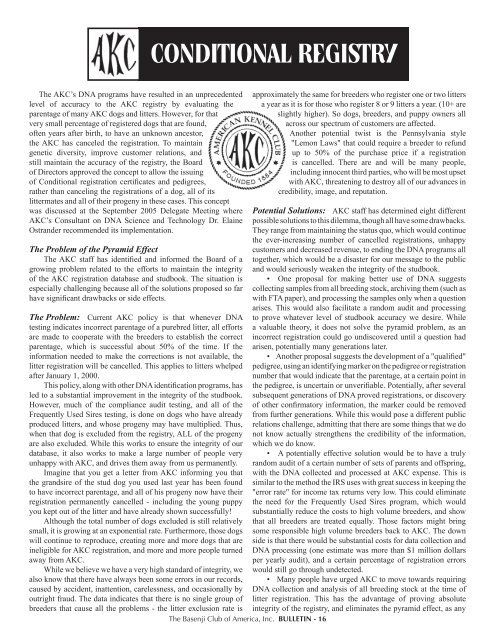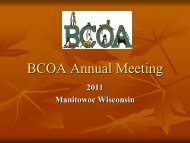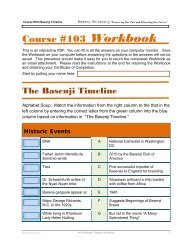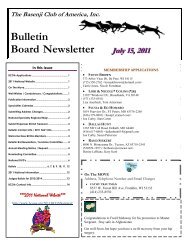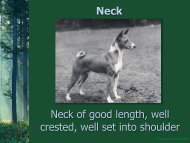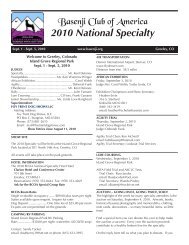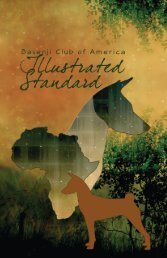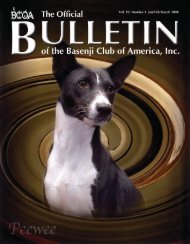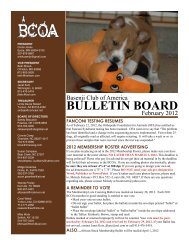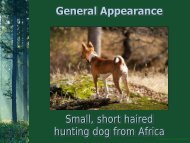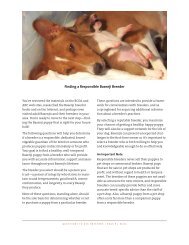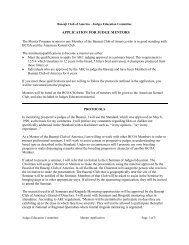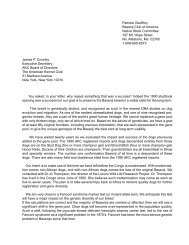BCOA Bulletin January-February-March 2007 - the Basenji Club of ...
BCOA Bulletin January-February-March 2007 - the Basenji Club of ...
BCOA Bulletin January-February-March 2007 - the Basenji Club of ...
You also want an ePaper? Increase the reach of your titles
YUMPU automatically turns print PDFs into web optimized ePapers that Google loves.
CONDITIONAL REGISTRY<br />
The AKC’s DNA programs have resulted in an unprecedented approximately <strong>the</strong> same for breeders who register one or two litters<br />
level <strong>of</strong> accuracy to <strong>the</strong> AKC registry by evaluating <strong>the</strong> a year as it is for those who register 8 or 9 litters a year. (10+ are<br />
parentage <strong>of</strong> many AKC dogs and litters. However, for that<br />
slightly higher). So dogs, breeders, and puppy owners all<br />
very small percentage <strong>of</strong> registered dogs that are found,<br />
across our spectrum <strong>of</strong> customers are affected.<br />
<strong>of</strong>ten years after birth, to have an unknown ancestor,<br />
Ano<strong>the</strong>r potential twist is <strong>the</strong> Pennsylvania style<br />
<strong>the</strong> AKC has canceled <strong>the</strong> registration. To maintain<br />
"Lemon Laws" that could require a breeder to refund<br />
genetic diversity, improve customer relations, and<br />
up to 50% <strong>of</strong> <strong>the</strong> purchase price if a registration<br />
still maintain <strong>the</strong> accuracy <strong>of</strong> <strong>the</strong> registry, <strong>the</strong> Board<br />
is cancelled. There are and will be many people,<br />
<strong>of</strong> Directors approved <strong>the</strong> concept to allow <strong>the</strong> issuing<br />
including innocent third parties, who will be most upset<br />
<strong>of</strong> Conditional registration certifi cates and pedigrees,<br />
with AKC, threatening to destroy all <strong>of</strong> our advances in<br />
ra<strong>the</strong>r than canceling <strong>the</strong> registrations <strong>of</strong> a dog, all <strong>of</strong> its<br />
littermates and all <strong>of</strong> <strong>the</strong>ir progeny in <strong>the</strong>se cases. This concept<br />
credibility, image, and reputation.<br />
was discussed at <strong>the</strong> September 2005 Delegate Meeting where Potential Solutions: AKC staff has determined eight different<br />
AKC’s Consultant on DNA Science and Technology Dr. Elaine possible solutions to this dilemma, though all have some drawbacks.<br />
Ostrander recommended its implementation.<br />
They range from maintaining <strong>the</strong> status quo, which would continue<br />
<strong>the</strong> ever-increasing number <strong>of</strong> cancelled registrations, unhappy<br />
The Problem <strong>of</strong> <strong>the</strong> Pyramid Effect<br />
customers and decreased revenue, to ending <strong>the</strong> DNA programs all<br />
The AKC staff has identifi ed and informed <strong>the</strong> Board <strong>of</strong> a toge<strong>the</strong>r, which would be a disaster for our message to <strong>the</strong> public<br />
growing problem related to <strong>the</strong> efforts to maintain <strong>the</strong> integrity and would seriously weaken <strong>the</strong> integrity <strong>of</strong> <strong>the</strong> studbook.<br />
<strong>of</strong> <strong>the</strong> AKC registration database and studbook. The situation is • One proposal for making better use <strong>of</strong> DNA suggests<br />
especially challenging because all <strong>of</strong> <strong>the</strong> solutions proposed so far collecting samples from all breeding stock, archiving <strong>the</strong>m (such as<br />
have signifi cant drawbacks or side effects.<br />
with FTA paper), and processing <strong>the</strong> samples only when a question<br />
arises. This would also facilitate a random audit and processing<br />
The Problem: Current AKC policy is that whenever DNA to prove whatever level <strong>of</strong> studbook accuracy we desire. While<br />
testing indicates incorrect parentage <strong>of</strong> a purebred litter, all efforts a valuable <strong>the</strong>ory, it does not solve <strong>the</strong> pyramid problem, as an<br />
are made to cooperate with <strong>the</strong> breeders to establish <strong>the</strong> correct incorrect registration could go undiscovered until a question had<br />
parentage, which is successful about 50% <strong>of</strong> <strong>the</strong> time. If <strong>the</strong> arisen, potentially many generations later.<br />
information needed to make <strong>the</strong> corrections is not available, <strong>the</strong> • Ano<strong>the</strong>r proposal suggests <strong>the</strong> development <strong>of</strong> a "qualifi ed"<br />
litter registration will be cancelled. This applies to litters whelped pedigree, using an identifying marker on <strong>the</strong> pedigree or registration<br />
after <strong>January</strong> 1, 2000.<br />
number that would indicate that <strong>the</strong> parentage, at a certain point in<br />
This policy, along with o<strong>the</strong>r DNA identifi cation programs, has <strong>the</strong> pedigree, is uncertain or unverifi able. Potentially, after several<br />
led to a substantial improvement in <strong>the</strong> integrity <strong>of</strong> <strong>the</strong> studbook. subsequent generations <strong>of</strong> DNA proved registrations, or discovery<br />
However, much <strong>of</strong> <strong>the</strong> compliance audit testing, and all <strong>of</strong> <strong>the</strong> <strong>of</strong> o<strong>the</strong>r confi rmatory information, <strong>the</strong> marker could be removed<br />
Frequently Used Sires testing, is done on dogs who have already from fur<strong>the</strong>r generations. While this would pose a different public<br />
produced litters, and whose progeny may have multiplied. Thus, relations challenge, admitting that <strong>the</strong>re are some things that we do<br />
when that dog is excluded from <strong>the</strong> registry, ALL <strong>of</strong> <strong>the</strong> progeny not know actually streng<strong>the</strong>ns <strong>the</strong> credibility <strong>of</strong> <strong>the</strong> information,<br />
are also excluded. While this works to ensure <strong>the</strong> integrity <strong>of</strong> our which we do know.<br />
database, it also works to make a large number <strong>of</strong> people very • A potentially effective solution would be to have a truly<br />
unhappy with AKC, and drives <strong>the</strong>m away from us permanently. random audit <strong>of</strong> a certain number <strong>of</strong> sets <strong>of</strong> parents and <strong>of</strong>fspring,<br />
Imagine that you get a letter from AKC informing you that with <strong>the</strong> DNA collected and processed at AKC expense. This is<br />
<strong>the</strong> grandsire <strong>of</strong> <strong>the</strong> stud dog you used last year has been found similar to <strong>the</strong> method <strong>the</strong> IRS uses with great success in keeping <strong>the</strong><br />
to have incorrect parentage, and all <strong>of</strong> his progeny now have <strong>the</strong>ir "error rate" for income tax returns very low. This could eliminate<br />
registration permanently cancelled - including <strong>the</strong> young puppy <strong>the</strong> need for <strong>the</strong> Frequently Used Sires program, which would<br />
you kept out <strong>of</strong> <strong>the</strong> litter and have already shown successfully! substantially reduce <strong>the</strong> costs to high volume breeders, and show<br />
Although <strong>the</strong> total number <strong>of</strong> dogs excluded is still relatively that all breeders are treated equally. Those factors might bring<br />
small, it is growing at an exponential rate. Fur<strong>the</strong>rmore, those dogs some responsible high volume breeders back to AKC. The down<br />
will continue to reproduce, creating more and more dogs that are side is that <strong>the</strong>re would be substantial costs for data collection and<br />
ineligible for AKC registration, and more and more people turned DNA processing (one estimate was more than $1 million dollars<br />
away from AKC.<br />
per yearly audit), and a certain percentage <strong>of</strong> registration errors<br />
While we believe we have a very high standard <strong>of</strong> integrity, we would still go through undetected.<br />
also know that <strong>the</strong>re have always been some errors in our records, • Many people have urged AKC to move towards requiring<br />
caused by accident, inattention, carelessness, and occasionally by DNA collection and analysis <strong>of</strong> all breeding stock at <strong>the</strong> time <strong>of</strong><br />
outright fraud. The data indicates that <strong>the</strong>re is no single group <strong>of</strong> litter registration. This has <strong>the</strong> advantage <strong>of</strong> proving absolute<br />
breeders that cause all <strong>the</strong> problems - <strong>the</strong> litter exclusion rate is integrity <strong>of</strong> <strong>the</strong> registry, and eliminates <strong>the</strong> pyramid effect, as any<br />
The <strong>Basenji</strong> <strong>Club</strong> <strong>of</strong> America, Inc. BULLETIN - 16


